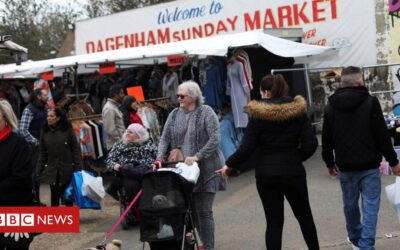More home working is likely to be a permanent fixture for a majority of businesses, according to a study.A survey of just under 1,000 firms by the Institute of Directors (IoD) shows that 74% plan on maintaining the increase in home working.More than half planned on reducing their long-term use of workplaces.A smaller survey of bosses whose firms had already cut workplace use suggested 44% of them thought working from home was proving “more effective”.”Remote working has been one of the most tangible impacts of coronavirus on the economy. For many, it could be here to stay,” said Roger Barker, director of policy at the IoD.”Working from home doesn’t work for everyone, and directors must be alive to the downsides. Managing teams remotely can prove far from straightforward, and directors must make sure they are going out of their way to support employees’ mental wellbeing.”Development opportunitiesCompanies are not likely to switch fully to home working, he continued.”The benefits of the office haven’t gone away. For many companies, bringing teams together in person proves more productive and enjoyable. Shared workspace often provides employees the opportunity for informal development and networking that is so crucial, particularly early on in a career.”The UK’s oldest business lobby group said 958 company directors were surveyed between 11 and 31 September, mostly from smaller businesses.The study follows a BBC survey in August which suggested that 50 of the biggest UK employers had no plans to return all staff to the office full-time in the near future.The BBC questionnaire found that 24 firms did not have any plans in place to return workers to the office.However, 20 have opened their offices for staff unable to work from home.Nine in 10 workers who have worked from home during lockdown would like to continue in some form, researchers found in an academic study.A report published in August by academics at Cardiff and Southampton universities suggests the majority of people working from home are as productive, if not more.Thousands of people were surveyed three times between April and June.
BBC Business News Articles
'I'm angry they think our business isn't important'
The owners of soft play and indoor sports facilities have warned they face financial ruin. While such businesses opened in England in mid-August they remain closed in Scotland.Many soft play centres, theatres and nightclubs had hoped to open on Monday but some fear they now never will. Last week First Minister Nicola Sturgeon confirmed that the date of their reopening had been postponed until at least 15 October. She said it would not be sensible to ease restrictions while infection rates were rising. The sectors had previously been given indicative reopening dates of 14 September and 5 October. ‘I feel angry’Craig Meikle, who owns Saltire soft play and football centre in Dalkeith, has run out of patience.”I feel angry when I wake up in the morning, angry when I go to bed at night and angry every hour in between,” he said.”My wife and I have spent six years building this business up to be a sustainable business. “We’re not going to get rich from this but our staff would have said they were in a stable secure job.”He says the business is six to eight weeks away from collapse. In six months of closure, he says £166,000 has left his business bank account with just £49,000 in furlough payments coming in. His business took a £100,000 loan to survive which is almost gone. Reopening postponed for theatres, live music venues and soft play
Nightclub and festival job losses are “unavoidable”
Mr Meikle says he is now at the mercy of his creditors but thanks to an understanding landlord, he is still hopeful for his business.He told BBC Scotland: “So when you hear the chancellor talking about support packages for viable businesses it drives me absolutely nuts. “When I think we have got a viable business that offers an important service to the community and it’s not a business that either the Scottish government or the UK government are seeing fit to support financially, rage is probably the best feeling I could explain.”Saltire has had no financial help outside the job retention scheme and the business did not qualify for any grants. Mr Meikle has seen other businesses receive awards of up to £25,000 which have been allowed to reopen and earn money. His frustration is in getting no financial help and still being unable to earn.He is not alone. New rules don’t helpMike Ferguson runs Forfar Indoor Sports. He says his phone never stops ringing asking if they are open. And he has had to watch his customers go elsewhere to venues that can open.He said: “We are praying that on the 15th we get going. Heading towards something and not getting there is demoralising. “The furlough scheme has been excellent for staff but we now have to think seriously about letting staff go. “We can’t carry on paying even a share of staff wages and the new rules don’t assist.”Mr Ferguson says he is now trying to plan for reopening without a date. Cancellation of the 15 September deadline hit hard with training completed, deep cleans paid for and food wasted.He said: “If they are not coming to us they are going somewhere else. That’s the most frustrating point of all of this.” A spokeswoman for the Scottish government said it understood the severe impact of the pandemic, but that Scotland was at a “critical point” as the virus continues to rise.She said: “Our absolute focus has been to help businesses survive and retain as much employment as possible – using the limited powers available to us and we have repeatedly urged the UK government to transfer to us the financial powers needed to fully respond to the pandemic.”Throughout this unprecedented economic crisis we have listened to businesses and business organisations and acted quickly to offer support which now exceeds £2.3bn. “Our support for businesses includes almost £900m of non-domestic rates relief for retail, hospitality and leisure businesses including soft play centres; the small business grant fund and the retail, hospitality and leisure grant fund worth over £1bn; the culture organisations and venues recovery fund which includes nightclubs. “We also created hardship and resilience funds unique to Scotland, with a value of £185m targeted at support for SMEs and the self-employed.”
'Shopping around is impossible when you don't have a computer'
With little more income than the state pension, Christine Chapman is careful with her money.The 70-year-old keeps paperwork meticulously in a filing cabinet and knows what is coming in and going out.Her bills were cut by hundreds of pounds a year, simply by switching insurance, phone and mobile suppliers.It all sounds like an advert for competition and the benefits of shopping around.But Mrs Chapman was lucky.Misplaced trust?The widow, from County Durham, does not have a computer and does not know how to operate one. Her smartphone is only used for calls and messages to family and friends. She had no way of shopping around for better deals.What she does have is a caring brother-in-law who taught IT and, after a conversation at a family gathering, realised Mrs Chapman was paying far too much on her bills.”She has no computer, no email address, and a router was stuck in a drawer because she did not know what to do with it,” says her brother-in-law Stephen Harris.”She is like millions of vulnerable people in this country who do not have any knowledge of the internet but trust big companies to treat her right.”‘Surprised’Mrs Chapman was a victim of the loyalty penalty – someone who sees prices rise every year when policies or deals are renewed.Take her home insurance. She had been a customer with the same company for more than 30 years and was paying a premium of £575 for buildings and contents insurance for a small three-bedroom terraced home. Mr Harris researched like-for-like policies and within 10 minutes he had found one for £80.”I was surprised,” says Mrs Chapman. “I was a loyal customer, thinking I was going to be getting the best deal.”She still “won’t have anything to do with computers” but now has a little more money to spend on her 12-month-old granddaughter.How price rises affect youSo-called price walking is when a customer is charged more, year after year, by staying with the same insurance company – even though their risk is no greater.The Financial Conduct Authority (FCA) points to an example in which a new customer for home insurance typically pays £130 for a year’s cover. But for the same policy, having stayed with the same insurer for five years, that annual premium rises to £238.For motor insurance, new customers pay £285 while customers who have been with their provider for more than five years pay £370, according to the FCA’s example.Cases such as these led Citizens Advice to submit a super-complaint two years ago, demanding action on the loyalty penalty across the mobile, broadband, home insurance, mortgage and savings sectors.Super-complaints are relatively rare, only used for the more serious issues, and require a response by law from the authorities subject to the complaint.In this area, there has been progress, but there remains “room for improvement”, according to the charity’s chief executive, Dame Gillian Guy.Particularly pressing, according to its survey, is that one in four people asked found it more difficult to switch providers during lockdown.”At a time when many people are struggling to pay their bills because of coronavirus, it’s simply not right that companies can still get away with exploiting their loyal customers,” Dame Gillian says.So what is the answer to making the system fairer? Encouraging people to switch, and making it easier to do so? Businesses giving vulnerable customers targeted help? Or a total overhaul of the rules?All three are being tried in home and motor insurance, a sector that the UK’s financial regulator estimated was still overcharging loyal customers by £1.2bn a year.Initially, people were given more information to encourage them to switch at their annual policy renewal, such as clear details of how much they paid the previous year, alongside a quote for the next year.Insurers then stepped up with a scheme in which they review prices, particularly for those who have been with the same company for five years or more.The Association of British Insurers said there had been 8.5 million “pricing interventions” as a result, saving people between £40 and £150 each on their annual premiums.’Radical’That is not enough, according to the City watchdog, the Financial Conduct Authority (FCA), which has proposed “radical” reforms to save consumers £3.7bn over 10 years.If adopted, the plans would see anyone renewing their policy paying no more than they would as a new customer,.So those buying, for example, online would get the equivalent deal, whether renewing or a new customer.That would still prevent people such as Mrs Chapman, who do not have internet access, from getting the very cheapest deals. It could also result in price rises for those who do shop around every so often.Yet, it should stop so-called price walking – which sees the cost rise at every annual renewal.In other sectors regulators have also taken some action:In mobile and broadband, Ofcom has secured commitments from companies to cut the costs for out-of-contract customers, but Citizens Advice says this is not yet universal
In finance, proposals should see banks setting a single long-term interest rate for all easy access savings accounts from next year
In the mortgage sector, the FCA is investigating whether vulnerable people are particularly affected by the £1,000 a year average extra cost of staying with the same lender
The Citizens Advice survey suggested eight in 10 people were still paying some kind of loyalty penalty.For some, that may only result in spending a few pounds a year more than they need to. For others, it could make a huge difference to their finances.Mr Harris – who saw the cost at first hand – is now concerned about other vulnerable people, particularly those isolated during the pandemic, who are still paying too much through no fault of their own.Despite all the investigations and proposals for action, he says one basic principle should be addressed. “All we’d like is fairness,” he says.”But those least able to afford it are paying more.”How to start beating the loyalty penaltySwitching is not always easy, but the government-backed Money and Pensions Service has some tips for consumers:Haggle on deals such as broadband contracts – find out exactly what is being offered elsewhere and ring up your provider, select the “thinking of leaving” option, and get through to the retention or disconnection team
A pay-as-you-go mobile phone does not require a credit check, so this could be a better option for those with a chequered credit history
The mobile phone handset makes the biggest difference to your bill. If you are happy with your handset, or can buy one separately, consider switching to a SIM-only deal
When choosing insurance, check more than one price comparison website as they do not all cover the same companies, work out which cover is required, and check if choosing home and contents insurance from the same provider is cheaper
To hear more about the loyalty penalty, listen to Money Box Live on BBC Sounds
US election 2020: 'Trump's done what he said he would for business'
Like many Americans, Amy Fazackerley is worried about the economy. The 49-year-old runs a small business near Washington, DC in Virginia, which sells mats that roll up into bags – a product she invented in response to her sons’ Lego mess and she sees mom-and-pop firms like hers closing every day.”It breaks my heart,” she says. “The government has to step up.”But Ms Fazackerley’s worries aren’t changing her vote. The Republican backed Mr Trump in 2016 and will be voting for him again, thanks to his record promoting small business and confronting China over intellectual property theft – a key issue for her business, which faces a constant battle against knock-off products.”He’s actually done what he said he was going to do,” she says.’Pre-existing partisan lens’Mr Trump may have been dealt a blow after testing positive for coronavirus last week, temporarily halting his campaigning while he self-isolates.But when it comes to the economy at least, polls show approval of Mr Trump’s handling of the issue has held up – despite the upheaval caused by the pandemic, which has left more than 10 million people out of work and prompted an estimated 100,000 small businesses to shut forever.Though voters broadly rank the economy as a top concern and overall views have soured sharply, opinions on the subject are closely tied to whether a person identifies as Democrat or Republican.”The economy is very important but what we’re finding is that voters are interpreting the economic situation through a pre-existing partisan lens,” says Patrick Murray, director of the Monmouth University Polling Institute, which regularly surveys the nation.He says that has shielded the president from the drag that might be expected in a more typical election, when voters often pin blame for a downturn on the person and party in power.”Compared to 2016 and in fact compared to many other elections before this, the vast majority of the electorate was already locked in before the campaign even started and economic conditions changing, impeachments – all those things have very little impact.”‘Still the leader’That’s welcome news for President Trump, who has made his record cutting taxes, slashing labour and environmental regulations and defending US companies against foreign competitors a key calling card to voters.He captured the White House in 2016 with support from small business owners like Ms Fazackerley, who make up a key voting group in the US, which tends to lean conservative and punch above its weight when it comes to turnout at the polls.”Taxes are huge for small business, regulations are another huge issue. Those are probably our two biggest things,” says Lana Pol, 64, who runs five businesses in Iowa, including a trucking company and a warehousing firm. “When it comes to those things, President Trump is still the leader.”Ms Pol, a Republican, supported Mr Trump in 2016 and plans to vote for him again. She says she rates the current economy an “eight out of 10” and cites the president’s accomplishments, such as the 2017 tax cuts, which saved her businesses some $40,000 last year. “I’ve definitely been listening and watching all of it,” she says. “But I can’t think of anything that really would sway me.”‘Divided nation’The resilience of Mr Trump’s approval ratings on economic issues has frustrated Democrats and raised concerns that their candidate, former Vice-President Joe Biden, has not done enough to tie his opponent to the economic collapse.But the truism in American politics that the fate of a sitting president is tied to the state of the economy simply doesn’t bear out, says Graham Wilson, a professor of political science at Boston University, noting that partisan identity tends to be the main driver of votes.RNC 2020: Trump warns Biden will ‘demolish’ American dream
Joe Biden: ‘It’s time for people to come together’
Issues beyond the economy are driving the election this year, he adds.”This is an extremely divided nation,” he says. “There are really antagonistic, deeply felt divisions that go beyond the performance of the administration and the performance of the economy to how you think about this country, what it stands for and the component of what makes Americanism.”While Mr Trump has honed his economic pitch, he has also sought to excite his supporters by focusing on issues such as guns and law and order.Mr Biden, meanwhile, has focused his campaign on Mr Trump’s failures as a leader and his threat to democratic norms. And he faces pressure from the left to speak out more boldly when it comes to issues of policing and racial justice, which have sparked mass protests this year.’A strange time’That’s an area where Ronnie Slone, the owner of a consulting firm in Louisiana that provides staff training and development, says he is dissatisfied by both candidates.Mr Slone, who backed Mr Trump in 2016 as a breath of “fresh air”, says his support has been shaken by the president’s rhetoric, especially on racial issues,But he remains undecided, unconvinced that Mr Biden offers a real change, noting little progress in closing racial wealth gaps during the many decades Mr Biden served in government.”For small businesses, we need a pro-small business leader and we need a person that is going to be looking at the fact that equity is extremely important to people of colour and people of colour in business,” he says. “I haven’t heard the Biden-Harris campaign tell me anything that’s different from what I’ve seen for some years now.”While he continues to stand with the president when it comes to economic policies, Mr Slone says he’s not sure those issues, which typically guide his choices, will be top of his mind when voting this year.”It’s a strange time and we all know that,” he says. “The era, the world events, the cultural events – all those things are weighing heavily.”‘Inciting people’Raymond Searles, the long-time owner of a small coffee shop in the eastern state of Delaware, is a lifelong Republican, who backed Mr Trump in 2016, drawn in part by his record as a businessman and has never once voted for Mr Biden, though the candidate represented his home state in Congress for more than 30 years.But in a first this November, the 63-year-old plans to cast his ballot for Mr Biden.Mr Searles says his regrets over his 2016 vote formed almost immediately, when Mr Trump’s outrage over reports of small crowds at his swearing-in as president overshadowed the inauguration.And though the pandemic has forced Mr Searles to close his cafe and briefly go on unemployment benefit, he says it’s his horror at Mr Trump’s self-dealing, appointment of people with dubious credentials and divisive rhetoric that has over-ridden his traditional Republican loyalties.”The way he’s inciting people is just unacceptable to me,” he says. “I don’t see any other choice. It’s either what’s good for America and what’s good for future generations, or Trump.”
The woman who wants everyone to get a pension
The BBC’s weekly The Boss series profiles different business leaders from around the world. This week we speak to Romi Savova, founder and chief executive of pension firm PensionBee.After working in the financial industry for six years, Romi Savova says that she thought that transferring all her pensions to one provider would be easy.At the time, in 2014, she was leaving her job at the London office of US investment bank giant Morgan Stanley to join a tech company. But she very quickly realised her assumption about moving her pension was wrong.”I called financial advisors [for help], who didn’t call me back for three years,” she says. “Because I wasn’t an attractive customer.”I had a meaningful pension, but it wasn’t worth hundreds of thousands of pounds, like some of their clients.”When she did find a new pension provider, she says the process of switching was difficult, “with 20 pages of information to check through”, and all sorts of fees thrown at her.”I thought – if I work in finance all my working life, what must it be like for people who don’t?”With that in mind, Romi realised that she had an idea for a new business – an online and app-based pension firm that allowed people to quickly and simply consolidate all their pension pots in one place.”I started talking to everyone I know, to see what story they had about pensions,” says Romi, 35. “Everyone had one or more pensions that they knew very little about, wished they had online access to, and wanted to know they were getting good value.”So taking a leap of faith, in 2014 she began work on creating PensionBee with her friend Jonathan Lister Parsons. He ran a small tech business, and they had met at a start-up networking event in London.Securing £1m in funding from investors, both quit their jobs in 2015, and they launched the business a year later. Romi took the chief executive role, while Jonathan remains the chief technology officer.Today more than £1bn is invested in pensions via PensionBee, and it has 100,000 active users. It makes its money by charging an annual fee.Looking back, Romi says that the first few years of the business could be “challenging”.”When you start a business from scratch there are long, sleepless nights, and adrenaline-fuelled days where you need to be doing anything, and everything, and there’s no-one else to help you.”The London-based business quickly grew though, helped by growing awareness in the UK of the importance of pensions. This came as the UK government increased the age at which people get the state pension, and at the same time introduced auto-enrolment, whereby firms have to set up pensions for their staff.To help fuel its growth, PensionBee has now received more than £28m in total funding from investment firms. It offers its customers pension funds managed by industry heavyweights such as BlackRock, HSBC and Legal & General.Rivals offering a similar service to PensionBee include Moneybox, Smart Pensions and Penfold. Romi, who was born in Bulgaria, and then raised in South Africa, says that everyone should “put as much away as they can afford” towards their pension.Laura Blows, editor of Pensions Age magazine, says that PensionBee has shaken up the sector.”It is a young company within an old industry, being a leading example of how the sector can modernise the way it serves its clients, through the use of technology, and the focus on ease of user experience.”Romi says that unlike many companies and sectors of the economy, PensionBee has grown strongly during the continuing coronavirus pandemic. The number of new customers joining in the three months from March was said to be 37% higher than in the previous quarter.”Everyone was doing some level of reorganisation, whether that was for their house or admin,” says Romi, who went to university in the US.The company now has 102 employees, and while it may sound corny, Romi insists that “one of our unique values is love”.So how does the company show love? “I really wanted to create a place where people can be themselves, whatever their gender, ethnicity or sexual orientation, ” she says.”In big companies you have to hide who you are. [And] we have equal parental leave for mums and dads, with six months fully paid leave.”The company is also due to introduce a new fund that does not include any investment in fossil fuel firms. Romi says this is in response to the requests of some customers.More The Boss features:Looking ahead, she says that the focus of the business will remain the UK. “We always keep overseas in review, but in reality there are so many people in the UK who we haven’t reached and need helping.”But being so engulfed in the world of pensions, does Romi – a mum of two young children – ever think about her own eventual retirement?”I can’t see myself not working,” she says. “I’ve definitely tried holidaying, and I can make it through a week, but at that point I really miss things.”I don’t know yet what my retirement will look like. I don’t think it works the same for everyone. I look at my parents, and my dad is in his late 60s, and he is still working.”
Ola: London bans Uber rival over safety concerns
Transport for London (TfL), the capital’s transport authority, has banned Indian taxi app Ola over public safety concerns.The cab company has been operating in London since February.TfL said the firm reported a number of failings including more than 1,000 trips made by unlicensed drivers.Ola said it will appeal the decision and has 21 days to do so. It can operate in the meantime, according to the appeal rules.The transport authority said Ola did not report the failings as soon as it knew about them.”Through our investigations we discovered that flaws in Ola’s operating model have led to the use of unlicensed drivers and vehicles in more than 1,000 passenger trips, which may have put passenger safety at risk,” Helen Chapman, TfL’s director of licensing, regulation and charging, said.”If they do appeal, Ola can continue to operate and drivers can continue to undertake bookings on behalf of Ola. We will closely scrutinise the company to ensure passengers safety is not compromised.” Uber winThe ride-hailing company began operating in Cardiff in 2018 and has since spread to other UK locations.”We have been working with TfL during the review period and have sought to provide assurances and address the issues raised in an open and transparent manner,” Marc Rozendal, Ola’s UK Managing Director, said in a statement.”Ola will take the opportunity to appeal this decision and in doing so, our riders and drivers can rest assured that we will continue to operate as normal, providing safe and reliable mobility for London.” Last week, major rival Uber secured its right to continue operating in London after a judge upheld its appeal against TfL.The ride-hailing giant has been granted a new licence to work in the capital, nearly a year after TfL rejected its application, also over safety concerns because of unlicensed drivers.Westminster Magistrates’ Court heard that 24 Uber drivers shared their accounts with 20 others which led to 14,788 unauthorised rides.
Cineworld to shut down UK screens after Bond film delay
Cineworld is set to temporarily close its UK cinemas in the coming weeks.As first reported in the Sunday Times, the firm is writing to Prime Minister Boris Johnson and Culture Secretary Oliver Dowden to say the industry is now “unviable”.The firm says it has been hit by delays in the release of big-budget films, putting 5,500 jobs at risk.The premiere of James Bond film No Time To Die has been postponed twice and is now due for release in April 2021.’No-one untouched’It is hoped that the Cineworld cinemas will be able to reopen next year, with staff being asked to accept redundancy in the hope of rejoining the company when theatres open again.The head of the UK Cinema Association said he feared the Cineworld closure was “indicative of challenges faced by the entire UK cinema industry at the moment”.Phil Clapp said: “Although cinemas opened in July and have been able to deliver a safe and enjoyable experience, without major new titles then we understand we aren’t able to get as many people out of the home as we’d like.”He said no-one would be “untouched by the current challenges”. Philippa Childs of entertainment and broadcasting union Bectu said: “The delay in the release of the Bond film along with the other delayed releases has plunged cinema into crisis.”Studios will have to think carefully when considering release dates about the impact that will have for the long-term future of the big screen.”When approached by the BBC, major UK chains Vue and Odeon refused to comment on how many cinemas they might be keeping open.The Department for Digital, Culture, Media and Sport said it was supporting cinemas through a VAT cut on tickets and concessions, business rates holiday and bounce-back loans. “We urge the British public to support their local cinema and save jobs by visiting and enjoying a film in accordance with the [Covid-19] guidance.”Mothballed cinemasCineworld’s sites in the US, where it operates 546 theatres, could also be forced to close.Cineworld said in a statement: “We can confirm we are considering the temporary closure of our UK and US cinemas, but a final decision has not yet been reached.”Once a decision has been made we will update all staff and customers as soon as we can.” In September the firm reported a $1.6bn (£1.3bn) loss for the six months to June as its cinemas had to close because of coronavirus lockdowns.And it warned at the time that it might need to raise more money in the event of further restrictions – or film delays – due to Covid-19.Cineworld is the world’s second largest cinema operator, and the largest in the UK with 120 sites. It also owns the Picturehouse chain of smaller venues.Its other theatres globally include the Regal, Cinema City, and Yes Planet brands.Social distancing in cinemasAccording to the UK Cinema Association, operators should “organise seating to ensure two-metre distancing can be maintained; where two metres is not viable, one metre with risk mitigation is acceptable. Mitigations should be considered and those introduced set out in the risk assessment”. But in Scotland they must “organise seating to ensure two-metre distancing can be maintained”.It also says cinemas should introduce one-way flow through auditoriums, and provide floor markings and signage to remind customers to “follow social distancing wherever possible.” The film industry had hoped the release of No Time To Die would spark a movie-going revival in the UK, with so many cinemas having been mothballed for months following the Covid-19 lockdown in March.But on Friday the movie’s release was further delayed until 2 April 2021 “in order to be seen by a worldwide theatrical audience”.’Devastating year’Rob Arthur, an industry analyst at cinema strategists The Big Picture, said “the current market is broken”.”It has been a very challenging year both for Cineworld, and the world’s largest cinema group AMC,” he added.”Film release schedules are being changed on a daily, never mind weekly, basis. It has been a catastrophic, devastating, year for operators.”He said the decision by Cineworld to put their UK operation “into hibernation” until next year made sense.”You can’t keep meeting the fixed operating costs of electricity, gas, air conditioning, staff, social distancing measures, and so forth when audience numbers are only a small percentage of what they were before,” he said.”Meanwhile, customer confidence in visiting cinemas has to be restored and I don’t see that at the moment,” Mr Arthur added.”The crowds you used to see in London for example going from work directly to the cinema are not there.”He also said Cineworld’s cash reserves were running low and that both they and AMC had a high percentage of financial liabilities compared with their assets.He added: “Landlords to date have acted reasonably and the deferral of rent has helped the cinema industry, but that comes to an end as does furlough payments so the operators will have to seek remedies to restructure their businesses.”Deal scrappedAs lockdown restrictions around the world were gradually lifted in mid-to-late summer Cineworld had been able to reopen 561 out of 778 sites worldwide.But lockdown closures meant its group revenues sank to $712.4m in the first six months of the year, compared with $2.15bn a year earlier.The group loss this year also marked a huge fall from the pre-tax profits of $139.7m seen in the first six months of 2019.However, when it released those financial figures, Cineworld said recent trading had been “encouraging considering the circumstances”, with solid demand for Christopher Nolan’s spy film Tenet which was released in September.In June, Cineworld pulled out of a $2.1bn deal to buy the Canadian cinema chain Cineplex, a move which could lead to a legal battle.It is not just Cineworld which has struggled this year, with independent London cinema Peckhamplex closing its doors on 25 September due to falling visitor numbers and delayed releases. It had hoped to reopen in November, around the time the next James Bond film was due to be released.Are you a Cineworld employee? Share your experiences by emailing [email protected] include a contact number if you are willing to speak to a BBC journalist. You can also get in touch in the following ways:WhatsApp: +44 7756 165803
Tweet: @BBC_HaveYourSay
Please read our terms & conditions and privacy policy
If you are reading this page and can’t see the form you will need to visit the mobile version of the BBC website to submit your question or comment or you can email us at [email protected]. Please include your name, age and location with any submission.
Cruise refunds: 'Will we ever see our £5,000 again?'
Calvin and Debbie Orr had been saving up for the last five years to pay for a special cruise around the Mediterranean to celebrate their 25th wedding anniversary.For their first cruise, the couple from Berkshire had booked a 10-day trip through Planet Cruise costing £5,158. They weren’t surprised when it was cancelled in May, but say they didn’t expect it to be such a battle to get their money back. Five months on, and they are still waiting. “In May, we were told to wait up to 90 days (for a refund), which I felt was unacceptable, but had little choice,” Mr Orr, 52, explained. “After 90 days I called again, waited 110 minutes on phone to be told that there were still delays and they could not give me a timeframe. Communication has been atrocious. We just want our cash back,” he told the BBC.Planet Cruise, which is headquartered in Portsmouth, has apologised for the delays and said it is ‘taking all possible steps to ensure that customers receive their refunds as quickly as possible.’ First cruiseSince the couple booked the trip, Debbie has been made redundant from her job.”It’s gone from frustration to worry now, that will we ever see our £5,000 again? And given what’s happening with the economy, £5000 is a lot of money.””Unfortunately this was going to be our first cruise. And with Covid 19, I can’t see us ever booking another.” A message on Planet Cruise’s website says that it is experiencing “unprecedented volumes in the call centre” with staff trying to process more than 20,000 booking changes.Noeleen Jones from Greater Manchester had her cruise line holiday around northern Europe cancelled in April because of the coronavirus pandemic.But more than six months on, she is still waiting for a refund.Ms Jones, 39, booked the trip through Planet Cruise and paid £2,785 for five passengers. So far she’s only been refunded £162.”Planet Cruise say they are unable to give a refund date,” she said. Ruined plans”They should be able to tell us when the money will be returned. That rings alarm bells. The last thing they said to me was those waiting over 150 days for refunds are just being contacted now. It has been a nightmare,” she told the BBC.As a seasoned cruise passenger, Ms Jones was looking forward to her seventh cruise with three generations of her family. She was due to set sail from Southampton on 13 May with her husband Kevin, their three-year-old son Harrison and her parents for a one-week trip stopping off in Belgium, the Netherlands, Germany and France. Those plans were ruined when, as the virus spread, cruise companies started suspending operations in mid-March.’I feel lost’She said that the company tried to get her to take a voucher, which she refused, and after months of emails and phone calls she is growing increasingly frustrated: “It can take up to an hour to get through to anyone on the phone. It’s a lot of money and I need it back. I feel lost. I don’t know where to turn.”The Consumer Group Which? says this is far from an isolated case and has called on the Competition and Markets Authority, the consumer watchdog, to investigate how cruise companies have handled cancellations and refunds. “Months on from the height of the pandemic that saw travel plans cancelled across the globe, it is unacceptable that some cruise passengers are still waiting for refunds worth thousands of pounds” said Rory Boland, Editor of Which? Travel. “While delays might have been understandable initially, there is no longer any excuse for leaving passengers out of pocket.” Under consumer law, if you have a package holiday cancelled by the provider, then a refund should be provided for the whole holiday within 14 days. However, the sheer scale of cancellations due to the pandemic means refunds are taking much longer than usual.The UK cruise industry, which supports more than 80,000 jobs and generates £10bn for the UK economy each year, has been paralysed by the pandemic. Many of the major cruise lines have scrapped itineraries until 2021; Cruise ships are moored up around the globe with no passengers and nowhere to go.’We apologise’In a statement, the chief executive of Planet Cruise, Richard Downs, explained why processing refunds is proving to be more complex and time consuming than normal: “Often we are waiting for funds to be transferred to us by third party suppliers before we can refund the consumer. “Additionally, each cruise line, airline, accommodation provider and land tour operator has its own set of rules in relation to cancellations, refunds and credits that we have to apply and reconcile the tens of thousands of bookings which have been impacted.””We are faced with a constantly evolving and unfamiliar landscape that no one in the travel industry has had to navigate before,” he said. “Where we have failed to communicate effectively to our customers or refund their money within the timescale initially advised, we sincerely apologise. We have learnt from our mistakes and promise to do better by our customers in the future.”Sean Tipton from Abta, which represents the package holiday sector, said many companies have had to reduce staffing levels and that is further slowing down repayments.”Cruises are in effect floating package holidays and customers money is financially protected, including through ABTA if they are a member. Customers have been very patient and they have our sympathies,” he added.
Cruise refunds: 'Will we ever see our £5,000 again?'
Calvin and Debbie Orr had been saving up for the last five years to pay for a special cruise around the Mediterranean to celebrate their 25th wedding anniversary.For their first cruise, the couple from Berkshire had booked a 10-day trip through Planet Cruise costing £5,158. They weren’t surprised when it was cancelled in May, but say they didn’t expect it to be such a battle to get their money back. Five months on, and they are still waiting. “In May, we were told to wait up to 90 days (for a refund), which I felt was unacceptable, but had little choice,” Mr Orr, 52, explained. “After 90 days I called again, waited 110 minutes on phone to be told that there were still delays and they could not give me a timeframe. Communication has been atrocious. We just want our cash back,” he told the BBC.Planet Cruise, which is headquartered in Portsmouth, has apologised for the delays and said it is ‘taking all possible steps to ensure that customers receive their refunds as quickly as possible.’ First cruiseSince the couple booked the trip, Debbie has been made redundant from her job.”It’s gone from frustration to worry now, that will we ever see our £5,000 again? And given what’s happening with the economy, £5000 is a lot of money.””Unfortunately this was going to be our first cruise. And with Covid 19, I can’t see us ever booking another.” A message on Planet Cruise’s website says that it is experiencing “unprecedented volumes in the call centre” with staff trying to process more than 20,000 booking changes.Noeleen Jones from Greater Manchester had her cruise line holiday around northern Europe cancelled in April because of the coronavirus pandemic.But more than six months on, she is still waiting for a refund.Ms Jones, 39, booked the trip through Planet Cruise and paid £2,785 for five passengers. So far she’s only been refunded £162.”Planet Cruise say they are unable to give a refund date,” she said. Ruined plans”They should be able to tell us when the money will be returned. That rings alarm bells. The last thing they said to me was those waiting over 150 days for refunds are just being contacted now. It has been a nightmare,” she told the BBC.As a seasoned cruise passenger, Ms Jones was looking forward to her seventh cruise with three generations of her family. She was due to set sail from Southampton on 13 May with her husband Kevin, their three-year-old son Harrison and her parents for a one-week trip stopping off in Belgium, the Netherlands, Germany and France. Those plans were ruined when, as the virus spread, cruise companies started suspending operations in mid-March.’I feel lost’She said that the company tried to get her to take a voucher, which she refused, and after months of emails and phone calls she is growing increasingly frustrated: “It can take up to an hour to get through to anyone on the phone. It’s a lot of money and I need it back. I feel lost. I don’t know where to turn.”The Consumer Group Which? says this is far from an isolated case and has called on the Competition and Markets Authority, the consumer watchdog, to investigate how cruise companies have handled cancellations and refunds. “Months on from the height of the pandemic that saw travel plans cancelled across the globe, it is unacceptable that some cruise passengers are still waiting for refunds worth thousands of pounds” said Rory Boland, Editor of Which? Travel. “While delays might have been understandable initially, there is no longer any excuse for leaving passengers out of pocket.” Under consumer law, if you have a package holiday cancelled by the provider, then a refund should be provided for the whole holiday within 14 days. However, the sheer scale of cancellations due to the pandemic means refunds are taking much longer than usual.The UK cruise industry, which supports more than 80,000 jobs and generates £10bn for the UK economy each year, has been paralysed by the pandemic. Many of the major cruise lines have scrapped itineraries until 2021; Cruise ships are moored up around the globe with no passengers and nowhere to go.’We apologise’In a statement, the chief executive of Planet Cruise, Richard Downs, explained why processing refunds is proving to be more complex and time consuming than normal: “Often we are waiting for funds to be transferred to us by third party suppliers before we can refund the consumer. “Additionally, each cruise line, airline, accommodation provider and land tour operator has its own set of rules in relation to cancellations, refunds and credits that we have to apply and reconcile the tens of thousands of bookings which have been impacted.””We are faced with a constantly evolving and unfamiliar landscape that no one in the travel industry has had to navigate before,” he said. “Where we have failed to communicate effectively to our customers or refund their money within the timescale initially advised, we sincerely apologise. We have learnt from our mistakes and promise to do better by our customers in the future.”Sean Tipton from Abta, which represents the package holiday sector, said many companies have had to reduce staffing levels and that is further slowing down repayments.”Cruises are in effect floating package holidays and customers money is financially protected, including through ABTA if they are a member. Customers have been very patient and they have our sympathies,” he added.
Shuttered by Covid: The end of Dagenham Sunday Market
For almost two decades, an empty plot of land on the outskirts of London was transformed every weekend into one of the UK’s biggest markets. Traders travelled from across the country for the chance of selling their goods to thousands of customers searching for bargains and banter. Then coronavirus changed everything.Six months ago, Dagenham Sunday Market ceased trading and it won’t now reopen. The community has lost a much-loved market and its traders are having to adapt to the future.Sunday was the highlight of Bill Watson’s week.The veteran tradesman would wake up early and drive to Dagenham Sunday Market, on the outskirts of London, before 06:00 to set up his stall selling memorial plaques and artificial flowers. As a fixture at the market for more than a decade, his usual spot was in a prime position – next to a catering van where people queued for their morning cup of tea. He knew all of the traders around him well, and looked forward to the weekly banter. “On my right I had somebody selling tools. Opposite me was ladies’ fashion, on their left was someone selling jewellery and to the right someone selling hats and sunglasses. The guy next to him was selling sportswear, the one next to him was selling make-up,” he recalls.From the moment the market opened, Bill would be busy haggling with customers and chatting with anyone who stopped at his stall.Like those around him, he thrived in the hustle and bustle of the market.”You walk down the stalls and you hear music coming from this one, music coming from that one. You get the smell of the flipping burgers and the onions. It had everything,” he says.But earlier this year, Bill’s beloved Sundays came to an abrupt end when regulations to curb the spread of coronavirus saw the market close its doors. In a letter posted on social media in June, the market’s owners announced the “end of an era”.”We’ve managed to outlast all markets of our kind but we will sadly not outlast Covid-19,” the letter said. “We will miss the banter, the East End atmosphere and not forgetting the amazing bargains.”Dagenham Sunday Market had closed for good.The beginningCo-owner Frank Nash, 60, says he got into the market trade “by accident” when a cloth-maker he was working for in his 20s fell into liquidation.”The only way to get rid of a lot of the stock was through the markets,” he says, “So I started doing that and then I came up with the idea of running them.”Frank and a school friend opened their first market in Essex’s Canvey Island in 1986. From there, he says it became “a bit of a travelling show”, moving to London Docklands and then to Dagenham, where it eventually settled on the 20-acre site near the River Thames that it remained on until March.By the time it closed this summer, Dagenham had become one of the biggest markets in the UK, boasting 10,000 to 15,000 customers every Sunday. Last year, a BBC TV series called Good Morning Dagenham followed the traders.Frank says the secret to Dagenham’s success was that it always retained the spirit of a traditional East London market.”We were a throwback. At one time, it was a social thing to go shopping. In the fast world we live in, it’s not social anymore – it’s something to just get out the way,” he says. “Our formula was loads of people crammed in, friendly atmosphere, lots of banter.”The market Hundreds of traders worked at the market every Sunday, from butchers to toy auctioneers. “It was unique. It was very much like the markets I’d worked at 30 or 40 years ago,” says veteran London clothes trader John Grainger. “It was like a proper East End traditional market. It still had that proper buzz and atmosphere. The customers were proper East London, Essex, Kent.”Another long-term trader, Matt Firman, described Dagenham as a community where “everyone helps each other out”.He was best known at the market for his Christmas toy auction and would spend months building his stock for the festive rush.”We’d bring two lorries there full of toys. I’d be there in the lorry and I’d pick up say five toys. I’d describe the toys and say how much they were in the shop. It’d be like ‘all that there comes to £60, but we’re not going to charge you 60, 50, 40, 30, not even 20. Who’s got a tenner?’ Then all the hands would go up for a tenner,” he recalls.Like other traders, ladies’ fashion seller Julie-Ann Scott worked at several markets during the week. But Dagenham was “one of its own”.”People used to just come and have a chat even if they didn’t buy – you got to know everyone. You got to know their families. You got to know what they went through in life,” she says.The closureWhen it temporarily stopped trading in March, everyone thought the market would be up and running again by September. Its 19-year run on the same plot was due to finish at the end of the year, but Frank says he had hoped to find a new location, before “the pandemic stopped us in our tracks”.”The beauty of the place is that old fashioned shoulder-to-shoulder hustle bustle. You start diluting that and… it just wouldn’t be the same. People don’t want to see a limping dog of a business,” he says of the decision to shut Dagenham for good. Although we’re a market, we’re more like a mass gathering. The last thing you want is to be shut down or be some sort of hot spot for the virus.”Frank says ringing the traders in June to break the news was like “telling someone over and over again that someone in their family has died”.”None of us saw it coming. I think I’m still in shock,” Julie-Ann said in an interview this summer. “We didn’t get to say goodbye.”Customers learned of the news when the statement was posted on Facebook. Its importance to the local community was cemented in thousands of responses mourning its closure.”Absolutely gutting for everyone – I have been visiting since I was a child and now with my own children,” one wrote, in a sentiment echoed by others.”It’s been a huge part of my life,” another said, while a third wrote simply: “I will miss all my friends.”The futureSix months since the last day of trading at Dagenham Sunday Market, its owners and traders are trying to adjust to a new way of working.Frank has now launched an app, Dagenham Market 24/7, connecting the market’s traders and customers. So far, he says about 18,000 people have downloaded it.”At the moment it’s like a directory, but we’re trying to make it so people can make videos and sell within it like on the market,” he says.After decades of spending his Sundays at the market, Frank says it’s “weird” to have free time, but that he’s “quite enjoying” it. Many of the ex-traders are experiencing similar feelings.”I cut the grass the other Sunday and I thought to myself ‘I’ve never done this before. I’ve never cut the blinking grass on a Sunday,'” Bill says.He and other Dagenham traders have also turned their attention online in a bid to make up for the lost income – creating websites, posting social media videos and offering home deliveries.While he is still missing the market, he says a lot of his customers have now found his Affordable Memorials company online.”My back was against the wall and I changed how I was doing things. I’m on Facebook now. When I do a crazy little sing-song on Facebook, I want people to say ‘oh there he is’. Then they’ll buy from you there,” he says.”We’re entrepreneurs. Del Boy was bang on: ‘He who dares…'”










